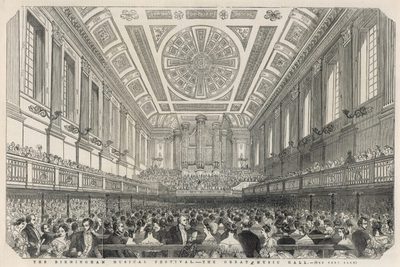
Closing Concert: Mendelssohn’s Elijah
Closing Concert: Mendelssohn’s Elijah
In this Closing Concert, discover Felix Mendelssohn's triumphant oratorio anew as the Edinburgh Festival Chorus and Royal Scottish National Orchestra breathe life into his most famous work.
Elijah follows the biblical story of the Old Testament prophet Elijah. Elijah defeats the worshippers of the false god Baal and performs extraordinary miracles, culminating in his exile by the ruthless Queen Jezebel.
Written for the 1846 Birmingham Music Festival by Mendelssohn, the score combines Baroque grandeur with luscious Romantic orchestration. Packed with thrilling choruses and lyrical solos and ensembles, Elijah promises to delight. Elijah himself gets some of the most evocative numbers, from his dramatic aria ‘Is not his word like a fire?’ to his pensive soliloquy ‘It is enough’.
At its premiere this piece was hailed as a ‘total triumph' and was performed at every subsequent Birmingham Music Festival. The Edinburgh Festival Chorus, Royal Scottish National Orchestra and line up of stellar soloists join forces to infuse Mendelssohn’s celebrated work with fresh energy.
This concert will be recorded for broadcast by our partners BBC Radio 3. Find out more.
Rising Stars of Voice programme joins this performance. Rising Stars gives the world’s most promising young musicians a chance to shine on an international stage.
powerful, focused and breathtakingly detailed... there was no doubting the love and conviction all the on-stage performers felt towards the pieceThe Scotsman on Edinburgh Festival Chorus at the 2024 Festival
RSNO Music Director Thomas Sondergard is a master at structuring the unfolding narrative of huge works
Listen on Soundcloud or Spotify.
This performance features the Edinburgh Festival Chorus. In 2025, the Edinburgh Festival Chorus celebrates 60 years at the heart of the International Festival. Listen to a special episode of The Warm Up, where Festival Director Nicola Benedetti and Chorus Director James Grossmith reflect on 60 years of incredible dedication and stirring performances.
Programme
Sung in English with surtitles.
A keepsake freesheet is available at the venue for this performance.
Full programme
Mendelssohn Elijah, Op.70
Performers
CloseOpen
- Royal Scottish National Orchestra
- Thomas SøndergårdConductor
- Edinburgh Festival Chorus
- James GrossmithChorus Director
- Rising Stars of Voice
- Christopher MaltmanElijah
- Mari EriksmoenThe Widow
- Karen CargillAn Angel
- Ben BlissObadiah
- Martha JohnsonThe Youth
Royal Scottish National OrchestraCloseOpen
- Thomas SøndergårdConductor
- First ViolinMaya Iwabuchi (leader)
Lena Zeliszewska (associate leader)
Tamás Fejes Assistant (leader)
Patrick Curlett
Lorna Rough
Alan Manson
Ursula Heidecker Allen
Caroline Parry
Susannah Lowdon
Elizabeth Bamping
Helena Rose
Gillian Risi
Stewart Webster
Sharon Haslam - Second ViolinJacqueline Speirs
Marion Wilson
Sophie Lang
Anne Bünemann
Kirstin Drew
Paul Medd
Colin McKee
Nigel Mason
Tom Greed
John Robinson
Joe Hodson
Seona Glen - ViolaTom Dunn (principal)
Felix Tanner
Asher Zaccardelli
Susan Buchan
Lisa Rourke
Claire Dunn
Katherine Wren
Maria Trittinger
Francesca Hunt
Beth Woodford - CelloPei-Jee Ng (principal)
Betsy Taylor
Kennedy Leitch
Rachael Lee
Sarah Digger
Robert Anderson
Gunda Baranauskaitė
Niamh Molloy - Double BassNikita Naumov (principal)
Michael Rae
Moray Jones
Alexandre Cruz dos Santos
Emily Green
William Puhr - FluteOliver Roberts (guest principal)
Janet Richardson (principal piccolo) - OboeAdrian Wilson (principal)
Peter Dykes - ClarinetTimothy Orpen (principal)
Duncan Swindells (principal bass clarinet) - BassoonDavid Hubbard (principal)
Jamie Louise White - HornAmadea Dazeley-Gaist (guest principal)
Alison Murray
Andrew McLean
David McClenaghan
Martin Murphy - TrumpetChristopher Hart (principal)
Katie Smith - TromboneDávur Juul Magnussen (principal)
Huw Evans
Alastair Sinclair (principal bass trombone) - TubaJohn Whitener (principal)
- TimpaniPaul Philbert (principal)
Edinburgh Festival ChorusCloseOpen
- Chorus DirectorJames Grossmith
- Soprano 1Val Beattie
Carol-Anne Burnett
Louise Cameron
Simona Cenci
Annette Chapman
Katherine Craig
Louise Cunningham
Lisa Dawson
Maggie Gilchrist
Clare Hewitt
Lorna Holl
Pippa Innes
Talitha Kearey
Andrea Kocsis
Natsuko Mortimer
Louise McGregor
Morag Michael
Kat Preston-Hynd
Alison Pryce-Jones
Ros Sutherland
Jennifer Swan
Lesley Walker - Soprano 2Emma Aitken
Anne Backhouse
Emily Borthwick
Susan Bowden
Rhona Brown
Deborah Buckingham
Rachael Cartwright
Kathryn Coad
Margaret Cumming
Rosamund Davidson
Dorothy Fairweather
Jane Gilhooly
Carol Haley
Leila Inglis
Lesley Johnston
Maggie Kinnes
Debbie Logan
Janet McKenzie
Emily McLeish
Kathy Miller
Katharine Oyler
Katharine Relph
Karen Traill
Federica Vian
Kathy White - Alto 1Moira Allingham
Ruth Bowen
Barbara Brodie
Jessica Brown
Yvonne Connell
Susan Crosby
Catherine Dunlop
Caroline Dunmur
Kirstie Fairnie
Rona Gray
Anne Grindley
Jane MacLeod
Frances McGlashan
Fiona Milligan
Tatiana Malikova
Stephanie Omari
Nicola Stock
Anna Marta Sveisberga
Mary Taylor
Kirsty Weaver
Susan White - Alto 2Jeanette Bell
Anna Borbely
Dinah Bourne
Sally Cameron
Wendy Colquhoun
Helen Coskeran
Ann Firth
Tori Graham
Linda Hunter
Caroline Low
Carol Madden
Frances McDevitt
Catriona McDonald
Lucy O'Leary
Judith Robertson
Elspeth Smith
Morag Watson - Tenor 1Joanna Bleau
Brendan Glen
David Leaver
David Lee
Gio MacDonald
Iain McIntyre
Martin McKean
Matt Norriss
Ian Phillips
Alex Rankine
Mike Towers - Tenor 2Richard Allison
Malcolm Bennett
Andrew Binnian
John Burnside
Richard Dearsley
Graham Drew
Richard Hellewell
Michael Jamieson
Matthew Kimble
Guy Johnson
Eric Turnbull
James White - Bass 1Derek Calder
Peter Cannell
Malcolm Crosby
Martin Gray
John Halliday
Nick Harding
David Hewitson
Andrew Hyder
Ivor Klayman
Andrew Lyons
David Mack-Smith
Tom Marshall
Andrew Moore
Graham Naysmith
Roger Robertson
Graham Scott
Andrew Williams - Bass 2Mark Adams
Ken Allen
Felix Boecking
Philip Coad
Callum Hay
Stephen Lipton
Sandy Matheson
John McLeod
Fraser Riddell
Neil Ryrie
Andrew Scott
Martin Scott
David Traill
Rising Stars of VoiceCloseOpen
- SopranoEmily Christina Loftus
- Mezzo-SopranoNancy Holt
- TenorJames McIntyre
- BassPeter Edge
Dive Deeper
Listen to The Warm Up: your audio introduction to the performance.
Programme Note
At the 2025 International Festival, we have commissioned a series of expert essays to help you Dive Deeper into your Festival experience.
This essay on Mendelssohn's Elijah explores how the critical reception of the initially acclaimed oratorio has changed in the centuries since the composer's death.

By Erik Levi
Erik Levi is visiting Professor of Music at Royal Holloway, University of London. He has published widely on the impact of Nazism on music, and his books include Mozart and the Nazis (2010) and The Routledge Handbook to Music under German Occupation, 1938–1945 (2020) which he has co-edited with David Fanning.
Resurrecting Elijah
Few pieces of music have experienced such wildly fluctuating reputations as Felix Mendelssohn’s powerfully dramatic oratorio Elijah. At first, praised to the skies, the work subsequently fell heavily out of fashion, only gradually regaining some of its former popularity following the end of the Second World War.
The earliest phase in its reception was unanimously positive. When Mendelssohn unveiled Elijah for the first time at the Birmingham Festival in 1846, it met with an ecstatic response. A review in The Times noted that “the last note of Elijah was drowned in a long continued unanimous volley of plaudits, vociferous and deafening”, and that “never was there a more complete triumph—never a more thorough and speedy recognition of a great work of art.”

The Birmingham Musical Festival showing the Great Music Hall with Mendelssohn conducting 'Elijah'.
© Illustrated London News Ltd/Mary EvansYet despite the overwhelming enthusiasm for Elijah from the Birmingham audience, the highly self-critical composer was not fully satisfied with what he had written. Over the next year, he subjected the oratorio to a comprehensive revision before returning to London for the last time in April 1847 to conduct four performances of the revised version in Exeter Hall. The response in The Times to Mendelssohn’s revisions was, if anything, even more acclamatory, leading the anonymous critic to place Mendelssohn’s achievement on the same level as Handel’s perennially popular Messiah and Israel in Egypt:
Elijah is now given to the world perfect, or at least as nearly perfect as the genius and science of this composer could make it. To affirm that it is his masterpiece is to place it on terms of absolute equality with the greatest works of the greatest musicians.Anonymous Critic, 1847
But what probably contributed more than anything to enhancing the long-term popularity of Elijah in nineteenth-century England was the endorsement of Queen Victoria and her husband Prince Albert, who were present at the second London performance. Overwhelmed by the impact of the music, Albert wrote a personal note of thanks to Mendelssohn, describing him as the “noble artist who, surrounded by the Baal-worship of false art, through genius and study has been able, like a second Elijah, to remain true to the service of true art.”
Mendelssohn Attacked
Forty years after the Birmingham premiere, Elijah showed no signs of losing its initial esteem in England, and at least 25 separate professional performances of the work took place during the 1885/1886 season. But the response to Mendelssohn’s oratorio in his native Germany was more mixed. Against a background of increasing cultural chauvinism and outright anti-Semitic prejudice, it became increasingly fashionable to disparage Mendelssohn’s achievement and question its enduring value. Leading the charge was Richard Wagner whose pernicious attacks on Mendelssohn, expounded in his essay ‘Das Judenthum in der Musik’, blamed what he perceived to be the composer’s shallowness on his Jewish background.
It was perhaps inevitable that the anti-Mendelssohn cult, spurred on by Wagner and his supporters, would eventually take hold in England. Although Elijah continued to maintain its place in the repertoire, at least until the beginning of the twentieth century, detractors such as George Bernard Shaw sought to demolish its previously unassailable position. In the late 1880s, Shaw lambasted Elijah for “its dreary fugue manufacture and its Sunday-school sentimentalities.” In time, many other writers took aim at Elijah. A good example was the distinguished critic Ernest Newman who felt that the popularity of Elijah merely satisfied the artistic needs of “a musically ignorant and unadventurous English public”. In a newspaper article, published in 1909, Newman went so far as to argue that Mendelssohn’s depiction of the priests of Baal inspired “no more terror in the audience than so many dear old Father Christmases.”
To his credit, Newman’s criticisms were based upon purely musical and aesthetic issues, and there is no intimation whatsoever of a racial bias. It was left to the Nazis to cynically exploit the racial card by not only banning all performance of Mendelssohn’s works in Germany, but also systematically attempting to write him out of musical history altogether.
Rediscovering the Masterpiece
The centenary of Mendelssohn’s death in 1947, two years after the demise of the Nazi regime, provided the perfect opportunity to clear the air, both in Germany and England. An editorial in the Musical Times argued that the charge of insipidness and sentimentality, so frequently aimed at the composer, had now gone too far. As for Elijah, it was time to halt the scorn attached to its presence in festival and choral society programmes, and cease debating whether the oratorio justified holding its place alongside choral works by Handel, Bach, Brahms and Verdi. What a new generation of critics had actually discovered was that “Elijah is after all a masterpiece, full of effective characterisation, assured in style and perfect in craftsmanship.” The critical reception of Elijah was indeed gradually turning full circle.
© Erik Levi, 2025